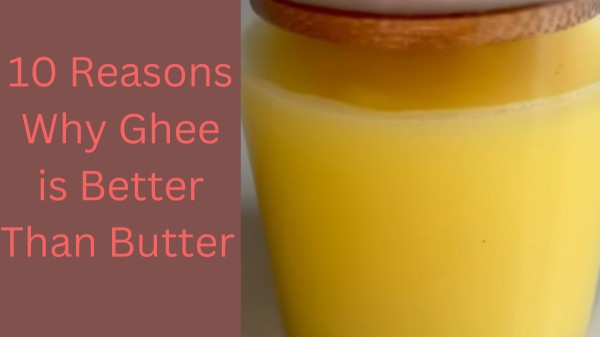Know the rich difference between ghee and butter. Although both are made from milk. Ghee, a clarified form of butter, is distinguished by high smoke point, lactose-free and long shelf life.
Learn about its benefits for heart health, digestion, skin and brain function. Unravel the calorie disparity and cholesterol debate, learn that, when consumed in moderation, ghee can be part of a healthy diet.
Why is Ghee Better Than Butter
Both ghee and butter are made from milk, which is used in cooking and baking. They are different in many ways. Ghee is a type of butter that is liquefied by heating and is separated from milk fat.
The milk caramelizes and solidifies, and the remaining oil is ghee. Butter can be heated to high temperatures without burning. This makes it ideal for frying food.
Ghee produces less of the toxin acrylamide when heated than other oils. Acrylamide is a chemical compound that develops when cooking starchy foods at high temperatures.
This chemical is known to increase the risk of cancer in animals, but it is not clear whether it increases the risk of cancer in humans.
Ghee is lactose-free, making it better than butter if you have an allergy or sensitivity to dairy products. Ghee is slightly higher in fat and calories than butter.
One tablespoon of ghee contains about 120 calories, while one tablespoon of butter contains about 102 calories.
Fat content varies based on the food manufacturer, but generally has a little more ghee.
Ghee is Better Than Butter
Here are some benefits of using ghee instead of butter:
- Higher smoke point: Ghee has a higher smoke point than butter, which means it can be heated to a higher temperature without burning.
- Lactose-free: Ghee is lactose-free, making it better than butter if you have an allergy or sensitivity to dairy products.
- Longer shelf life: this has a longer shelf life than butter as it does not contain milk solids that can spoil.
- Richer taste: Ghee has a richer, more nutritious taste than butter.
- Contains healthy fats: Ghee contains healthy fats that help improve cholesterol levels and reduce inflammation.
- Good for digestion: Ghee is rich in butyric acid, which can help improve digestion.
- Good for skin: Ghee is rich in vitamins A and E, which help improve skin health.
- Good for brain health: Ghee is rich in omega-3 and omega-6 fatty acids, which are important for brain health.
- Good for weight loss: Ghee contains medium-chain triglycerides (MCTs), which can help in weight loss.
- Good for cooking: Ghee has a high smoke point and a rich flavor, making it ideal for cooking and baking.
Please note that while ghee has several benefits, it is high in calories and should be consumed in moderation as part of a healthy diet.
Is Ghee Bad for Cholesterol
Ghee is high in saturated fat and cholesterol. According to a slideshow on WebMD, one tablespoon of ghee contains about 33 mg of cholesterol, which is about 11% of the recommended daily amount.
Ghee also has a high concentration of mono unsaturated omega-3, which is a healthy fatty acid that supports a healthy heart and cardiovascular system. Studies show that consuming ghee as part of a balanced diet can help lower unhealthy cholesterol levels.
In summary, although ghee is high in cholesterol and saturated fat, it can be part of a healthy diet when consumed in moderation. It is important to consult a healthcare professional to determine the right amount of ghee to consume based on individual dietary needs and health conditions.
Ghee vs Butter Calories
In terms of calories, ghee has a little more fat and more calories than butter. One tablespoon of ghee contains about 120 calories, while one tablespoon of butter contains about 102 calories. The difference in fat content, if you know your fat or calorie intake, will not affect your health.
Ghee is a type of butter that turns into liquid when heated and separates milk from fat. The milk caramelizes and hardens. The remaining oil is ghee. This ingredient has been used in Indian cultures for thousands of years.
Using ghee instead of butter has several benefits. It is suitable for frying instead of oil. This can withstand heat up to 485°F (252°C), but butter can smoke and burn at 350°F (177°C). Ghee produces less of the toxin acrylamide when heated than other oils.
Is Ghee Healthier Than Olive Oil
Ghee and olive oil are healthy fats that can be used in cooking and baking. They have some differences in terms of nutritional value and taste.
Ghee is commonly used in food. this is hotter than butter, good for frying and ideal for basting.
It also has a nutty flavor which makes it suitable for sensitivities. This makes it a good option for people.
On the other hand, olive oil is extracted from whole olives and is a staple of the Mediterranean diet. It is rich in monounsaturated fatty acids, which are known to be beneficial for heart health. Olive oil is less hot than ghee.
It is therefore used for low-heat cooking or as a finishing oil for salads and other dishes.
conclusion
Although both ghee and butter are made from milk, they differ significantly. Ghee, with its higher smoke point, is ideal for high-temperature cooking and offers benefits such as lactose-free, long shelf life and rich flavor.
Despite its cholesterol, studies have shown that ghee, in moderation, can be part of a heart-healthy diet. Comparatively, ghee and olive oil are distinct, with ghee excelling in high-heat applications and providing a unique flavor, while olive oil is prized for its heart-friendly monounsaturated fat and suitability for low-heat cooking or as a finishing oil. Choosing between them depends on personal preference and dietary needs.


1 thought on “10 Reasons Why Ghee is Better Than Butter”